
Calvinism, also called Reformed Christianity, is a major branch of Protestantism that follows the theological tradition and forms of Christian practice set down by John Calvin and various other Reformation-era theologians. It emphasizes the sovereignty of God and the authority of the Bible.
Philosophy of religion is "the philosophical examination of the central themes and concepts involved in religious traditions". Philosophical discussions on such topics date from ancient times, and appear in the earliest known texts concerning philosophy. The field is related to many other branches of philosophy, including metaphysics, epistemology, logic and ethics.
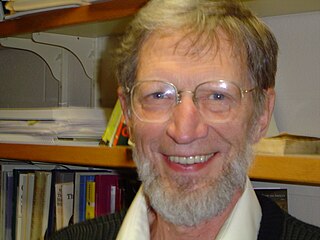
Alvin Carl Plantinga is an American analytic philosopher who works primarily in the fields of philosophy of religion, epistemology, and logic.

Predestination is a doctrine in Calvinism dealing with the question of the control that God exercises over the world. In the words of the Westminster Confession of Faith, God "freely and unchangeably ordained whatsoever comes to pass." The second use of the word "predestination" applies this to salvation, and refers to the belief that God appointed the eternal destiny of some to salvation by grace, while leaving the remainder to receive eternal damnation for all their sins, even their original sin. The former is called "unconditional election", and the latter "reprobation". In Calvinism, some people are predestined and effectually called in due time to faith by God, all others are reprobated.

Richard Granville Swinburne is an English philosopher. He is an Emeritus Professor of Philosophy at the University of Oxford. Over the last 50 years, Swinburne has been a proponent of philosophical arguments for the existence of God. His philosophical contributions are primarily in the philosophy of religion and philosophy of science. He aroused much discussion with his early work in the philosophy of religion, a trilogy of books consisting of The Coherence of Theism, The Existence of God, and Faith and Reason.

William Lane Craig is an American analytic philosopher, Christian apologist, author, and Wesleyan theologian who upholds the view of Molinism and neo-Apollinarianism. He is currently a Professor of Philosophy at Houston Christian University and a Research Professor of Philosophy at Biola University's Talbot School of Theology. Craig has updated and defended the Kalam cosmological argument for the existence of God. He has also published work where he argues in favor of the historical plausibility of the resurrection of Jesus. His study of divine aseity and Platonism culminated with his book God Over All.

Benjamin Breckinridge Warfield was an American professor of Reformed theology at Princeton Seminary from 1887 to 1921. He served as the last principal of the Princeton Theological Seminary from 1886 to 1902. After the death of Warfield in office, Francis Landey Patton took over the functions of the office as the first president of seminary. Some conservative Presbyterians consider him to be the last of the great Princeton theologians before the split in 1929 that formed Westminster Theological Seminary and the Orthodox Presbyterian Church.
Systematic theology, or systematics, is a discipline of Christian theology that formulates an orderly, rational, and coherent account of the doctrines of the Christian faith. It addresses issues such as what the Bible teaches about certain topics or what is true about God and His universe. It also builds on biblical disciplines, church history, as well as biblical and historical theology. Systematic theology shares its systematic tasks with other disciplines such as constructive theology, dogmatics, ethics, apologetics, and philosophy of religion.

Molinism, named after 16th-century Spanish Jesuit priest and Roman Catholic theologian Luis de Molina, is the thesis that God has middle knowledge : the knowledge of counterfactuals, particularly counterfactuals regarding human action. It seeks to reconcile the apparent tension of divine providence and human free will. Prominent contemporary Molinists include William Lane Craig, Alfred Freddoso, Alvin Plantinga, Thomas Flint, Kenneth Keathley, Dave Armstrong, John D. Laing, Timothy A. Stratton, Kirk R. MacGregor, and J.P. Moreland.

Nicholas Paul Wolterstorff is an American philosopher and theologian. He is currently Noah Porter Professor Emeritus of Philosophical Theology at Yale University. A prolific writer with wide-ranging philosophical and theological interests, he has written books on aesthetics, epistemology, political philosophy, philosophy of religion, metaphysics, and philosophy of education. In Faith and Rationality, Wolterstorff, Alvin Plantinga, and William Alston developed and expanded upon a view of religious epistemology that has come to be known as Reformed epistemology. He also helped to establish the journal Faith and Philosophy and the Society of Christian Philosophers.

In the philosophy of religion, Reformed epistemology is a school of philosophical thought concerning the nature of knowledge (epistemology) as it applies to religious beliefs. The central proposition of Reformed epistemology is that beliefs can be justified by more than evidence alone, contrary to the positions of evidentialism, which argues that while non-evidential belief may be beneficial, it violates some epistemic duty. Central to Reformed epistemology is the proposition that belief in God may be "properly basic" and not need to be inferred from other truths to be rationally warranted. William Lane Craig describes Reformed epistemology as "One of the most significant developments in contemporary religious epistemology ... which directly assaults the evidentialist construal of rationality."
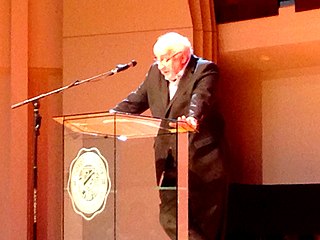
Richard John Mouw is an American theologian and philosopher. He held the position of President at Fuller Theological Seminary for 20 years (1993–2013), and continues to hold the post of Professor of Faith and Public Life.

Alister Edgar McGrath is a Northern Irish theologian, Anglican priest, intellectual historian, scientist, Christian apologist, and public intellectual. He currently holds the Andreas Idreos Professorship in Science and Religion in the Faculty of Theology and Religion, and is a fellow of Harris Manchester College at the University of Oxford, and is Professor of Divinity at Gresham College. He was previously Professor of Theology, Ministry, and Education at King's College London and Head of the Centre for Theology, Religion and Culture, Professor of Historical Theology at the University of Oxford, and was principal of Wycliffe Hall, Oxford, until 2005.
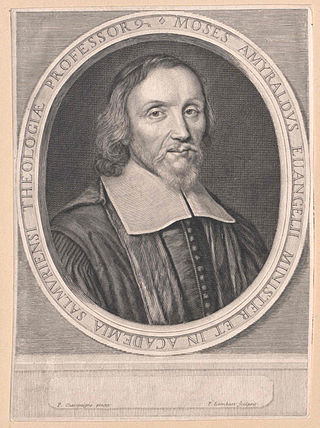
Amyraldism is a Calvinist doctrine. It is also known as the School of Saumur, post redemptionism, moderate Calvinism, or hypothetical universalism. It is one of several hypothetical universalist systems.
Robert Tillman Kendall is a Christian writer, speaker, and teacher who pastored Westminster Chapel for 25 years. He is author of more than 50 books, including Total Forgiveness. Kendall was part of the Word, Spirit, Power team, a non-denominational charismatic ministry.
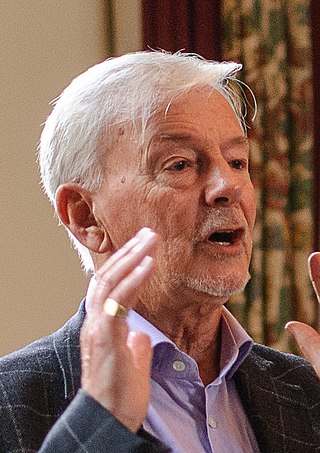
Keith Ward is an English philosopher and theologian. He is a fellow of the British Academy and a priest of the Church of England. He was a canon of Christ Church, Oxford, until 2003. Comparative theology and the relationship between science and religion are two of his main topics of interest.
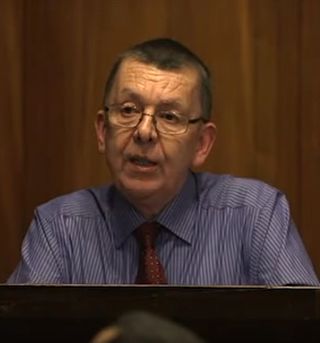
Brian Evan Anthony Davies is a British philosopher, Roman Catholic priest, and friar. He is Distinguished Professor of Philosophy, Fordham University, and author of An Introduction to the Philosophy of Religion, now in its fourth English edition, which has been translated into five languages.
Charles Taliaferro is an American philosopher specializing in theology and philosophy of religion. He is an emeritus professor of philosophy at St. Olaf College, a senior research fellow at the Institute for Faithful Research, and a member of the Royal Institute of Philosophy. He is the author, co-author, editor, or co-editor of twenty books, most recently The Image in Mind; Theism, Naturalism and the Imagination, co-authored with the American artist Jil Evans. He has been a visiting scholar or guest lecturer at a large number of universities, including Brown, Cambridge, Notre Dame, Oxford, Princeton, and the University of Chicago. Since 2013 Taliaferro is editor-in-chief of the journal Open Theology.
Kelly James Clark is an American philosopher noted for his work in the philosophy of religion, science and religion, and the cognitive science of religion. He is currently Senior Research Fellow at the Kaufman Interfaith Institute and Professor at Grand Valley State University in Grand Rapids Michigan.

Alan Philip Frederick Sell FSA, FRhistS was a minister of the United Reformed Church and was formerly Professor of Christian Doctrine and Philosophy of Religion at the United Theological College, Aberystwyth in Wales. An author in the fields of philosophy, theology, ethics and history he held prominent positions in various ecumenical organizations including the World Alliance of Reformed Churches.














